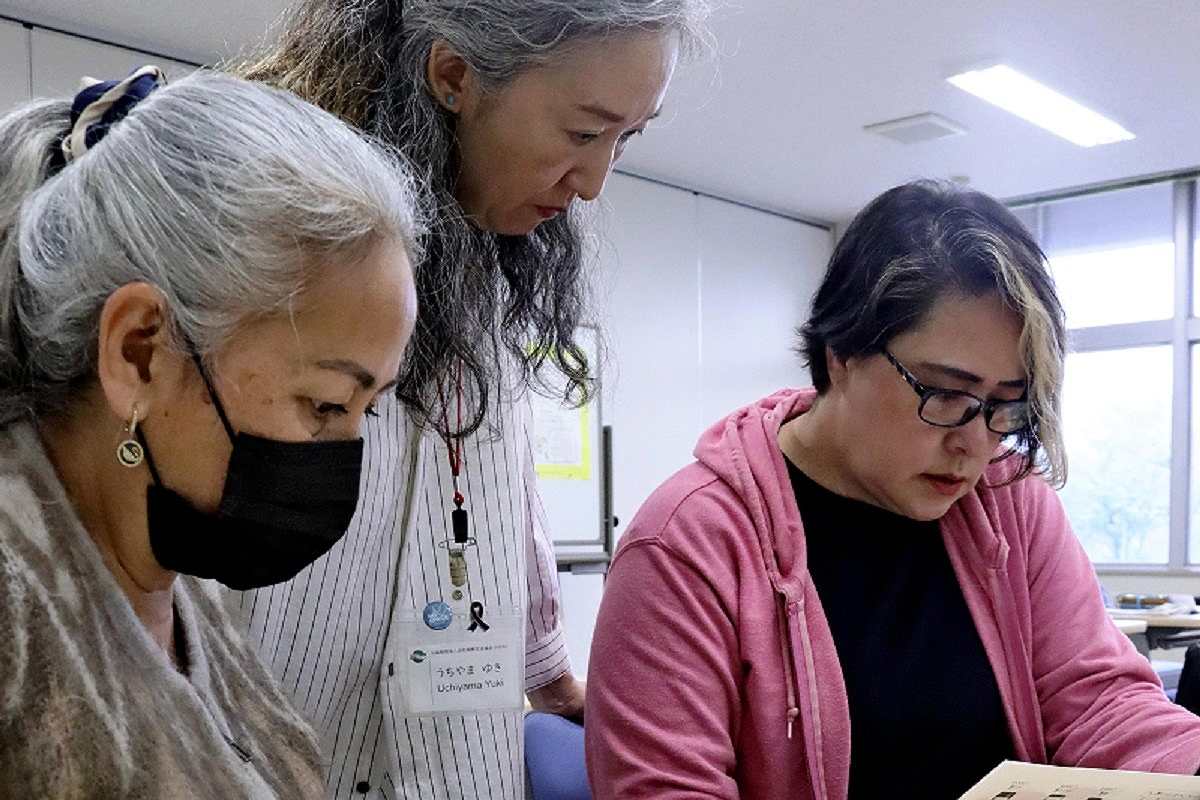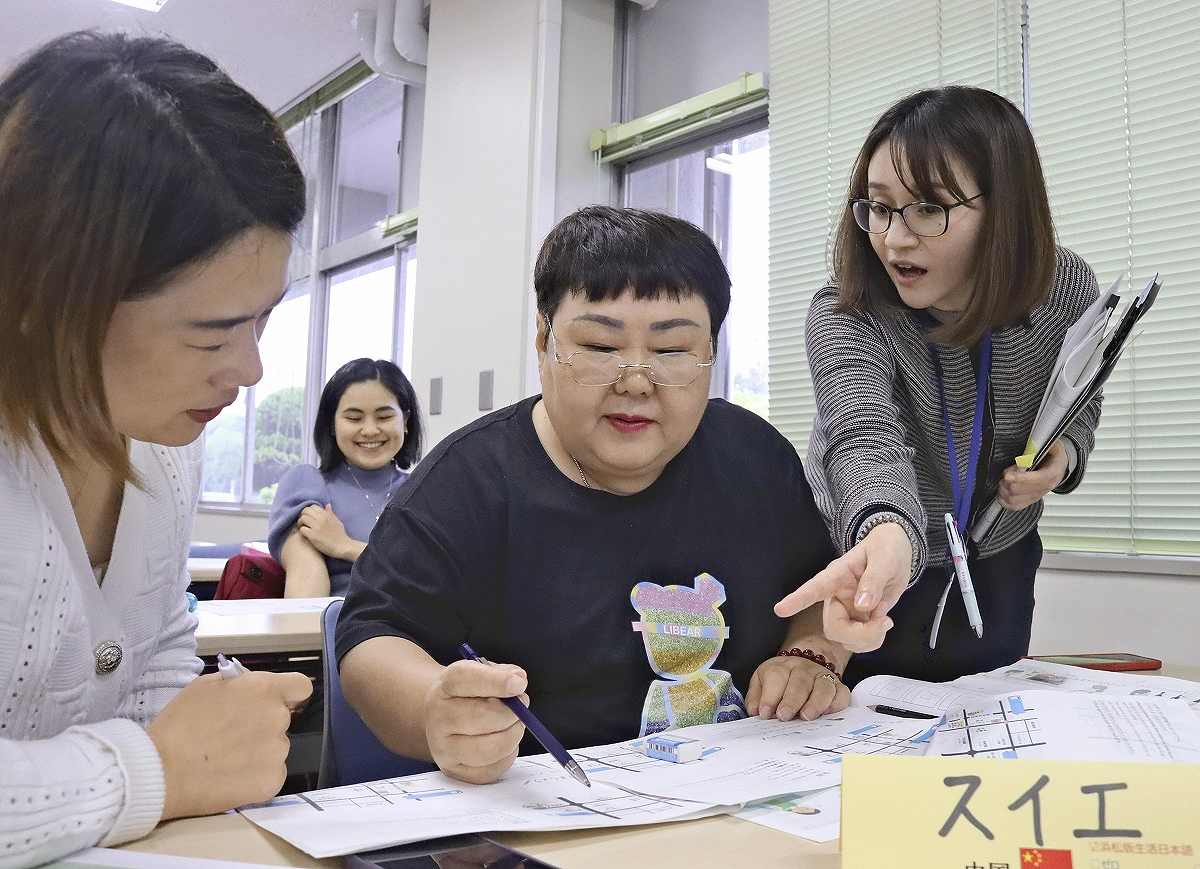Shizuoka Pref. City Offers Foreigners Free Japanese Language Classes; Aims to Raise Non-Natives to Daily Conversation Level


A foreign resident in Hamamatsu, Shizuoka Prefecture, learns Japanese-language conversation necessary for daily life from an instructor, right, in a class held the city’s Chuo Ward.
1:00 JST, August 25, 2024
Hamamatsu, a city with about 30,000 foreign residents in Shizuoka Prefecture, has launched an initiative to help foreign residents learn Japanese to the level necessary for daily life.
This is the first time a curriculum developed by the central government has been used for such an effort. Many sectors in the country often complain of labor shortages, but many foreigners still have difficulty communicating in Japanese. The city government hopes to help such foreigners become “independent users of Japanese.”
“Where does this pork come from?”
“It’s from Brazil.”
Students were taking part in a conversation class at the Hamamatsu Foreign Resident Study Support Center, learning phrases they might use when they go shopping. The instructor, an official from the Hamamatsu Foundation for International Communication and Exchange, was teaching about 20 students from their teens to 60s from six countries, including Brazil, the Philippines and China.
The students are mostly housewives and part-time workers who can speak only a little Japanese. One, a 57-year-old second-generation Brazilian of Japanese descent, who came to Japan six years ago, has been unable to get the sort of job she wants in customer service. She also has trouble describing her symptoms when she goes to the hospital.
“I’ve been learning conversation little by little. I want to find a job that requires communication,” she said.
Of the foreign residents in the city, about 70% have a residence status that allows them to stay in Japan for a long period of time, a figure higher than the national average of 38%. Hamamatsu has produced its own teaching materials based on the “Lifestyle Can Do,” a Japanese language learning curriculum created by the Japanese government in 2022. From this fiscal year, the city has begun teaching it to students free of charge.
Classes are held from morning into early afternoon, for 150 days a year, lasting for a total of 600 hours. Students learn what to say in 500 situations, such as giving their name and reservation time to a restaurant host and asking how to fill out an application form to open an account at a bank.
One of the features of the “Lifestyle Can Do” program is that it divides the daily conversation levels of foreigners into six levels, providing the first standardized scale for assessing their abilities. The levels range from C2, which means students “can easily understand almost everything they hear or read,” to A1, which means students “understand everyday expressions and basic phrases.” Students will learn up to B1, the fourth-highest level, which corresponds to those who “can understand the main points of familiar topics, such as work, school and entertainment.
According to the Education, Culture, Sports, Science and Technology Ministry, there are about 870 Japanese language courses run by local governments across the country. The ministry hopes to provide subsidies and other support for the spread of the “Lifestyle Can Do” curriculum.
“This is an effort to increase our use of capable workers from overseas and to help foreign nationals lead rich social lives in Japan,” said an official at the ministry’s Japanese language education division.
Related Tags
Top Articles in Society
-

Man Infected with Measles Reportedly Dined at Restaurant in Tokyo Station
-

Man Infected with Measles May Have Come in Contact with Many People in Tokyo, Went to Store, Restaurant Around When Symptoms Emerged
-

Woman with Measles Visited Hospital in Tokyo Multiple Times Before Being Diagnosed with Disease
-

Australian Woman Dies After Mishap on Ski Lift in Nagano Prefecture
-

Foreign Snowboarder in Serious Condition After Hanging in Midair from Chairlift in Nagano Prefecture
JN ACCESS RANKING
-

Japan PM Takaichi’s Cabinet Resigns en Masse
-

Japan Institute to Use Domestic Commercial Optical Lattice Clock to Set Japan Standard Time
-

Israeli Ambassador to Japan Speaks about Japan’s Role in the Reconstruction of Gaza
-

Man Infected with Measles Reportedly Dined at Restaurant in Tokyo Station
-

Man Infected with Measles May Have Come in Contact with Many People in Tokyo, Went to Store, Restaurant Around When Symptoms Emerged























